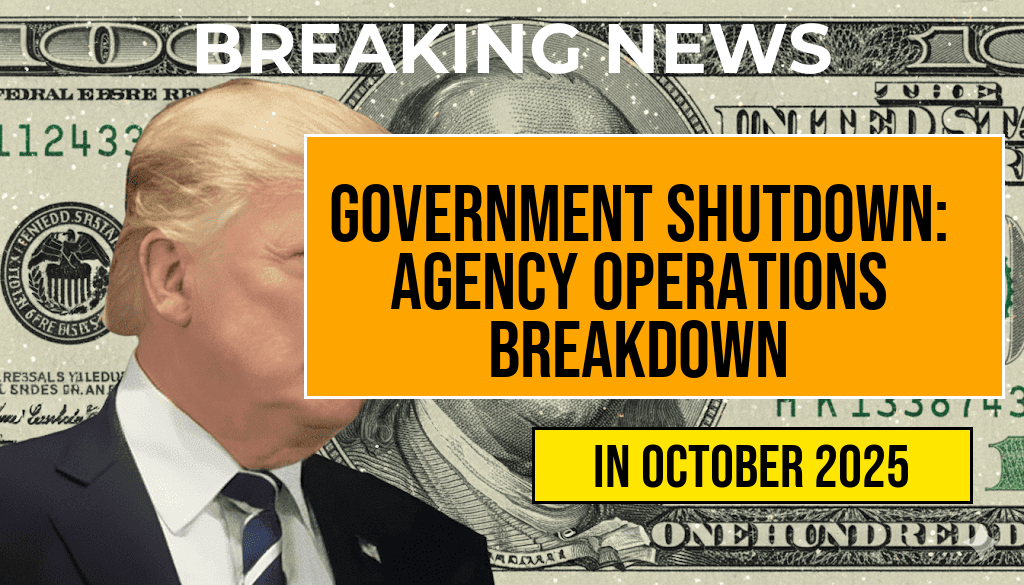The United States government has officially entered a shutdown after congressional negotiations failed to reach a funding agreement by the midnight deadline. This development halts or limits operations across numerous federal agencies, affecting millions of Americans and the functioning of vital government services. While some agencies maintain limited operations through emergency funding or mandatory spending, many will face closures or reduced services. The shutdown underscores longstanding political disagreements over budget priorities, with the impacts expected to ripple through social programs, national defense, public safety, and economic stability.
Impact Overview: Agencies Under the Shutdown
The shutdown primarily affects agencies funded through annual appropriations bills. Agencies like the Social Security Administration and the Internal Revenue Service (IRS) are preparing for operational disruptions, though some core functions will continue. Meanwhile, departments such as Defense and Transportation Security Administration (TSA) are grappling with staffing shortages and service delays. Below is a detailed breakdown of how various agencies are impacted, highlighting which operations are suspended, reduced, or maintained during the shutdown period.
Social Security Administration
Operational Status and Services
- Most Social Security offices will close to the public, with only emergency and urgent cases handled on a limited basis.
- Initial payments for Social Security benefits are scheduled to continue, as they are funded through mandatory spending, but processing new claims or inquiries may face delays.
- Online services and phone support are expected to remain functional, though with increased wait times due to reduced staff.
Internal Revenue Service (IRS)
Tax Processing and Enforcement
- The IRS will halt most non-urgent operations, including audits and processing of amended returns.
- Tax refunds scheduled for issuance will likely be delayed, especially for returns filed during the shutdown period.
- Customer service lines will experience long wait times, and in-person assistance at IRS offices will be unavailable.
- Essential functions, such as processing of electronically filed returns, may continue in a limited capacity.
Defense Department
Military and Civilian Operations
| Function | Status |
|---|---|
| Active Military Personnel | Paid and operational; essential missions continue |
| Civilian Employees | Many furloughed; some essential personnel remain on duty |
| Military Construction Projects | Generally halted or slowed down |
| Procurement and Maintenance | Limited activities; non-urgent procurement postponed |
Transportation Security Administration (TSA)
Airport Security and Travel
- TSA agents are expected to report to work without pay, relying on contingency funds, but staffing levels may decline over time.
- Security screening at airports will largely continue, though some smaller airports could face staffing shortages, leading to longer wait times.
- Other transportation safety programs, such as rail and transit inspections, are likely to be scaled back.
Other Affected Agencies and Services
Environmental Protection Agency (EPA)
- Most non-essential activities, including inspections and enforcement actions, are suspended.
- Research projects and environmental monitoring will be limited or paused.
Department of Health and Human Services (HHS)
- Discretionary programs, such as some grants and research initiatives, are halted.
- Operations related to public health emergencies and vital services continue, with staffing maintained for critical functions.
Federal Courts and Justice Department
- Most federal courts will cease non-urgent operations; only essential judicial proceedings will proceed.
- Some law enforcement functions, including federal investigations, continue with limited staffing.
Economic and Public Response
The shutdown’s broader economic implications are significant, with markets reacting to uncertainty and disruptions. Small businesses relying on federal contracts face delays, and government contractors may experience furloughs. Public confidence in government stability could also be affected, fueling debates over fiscal policy and legislative priorities.
For ongoing updates and official guidance, citizens are encouraged to consult White House announcements and the GovInfo portal. As negotiations continue, the duration and scope of the shutdown remain uncertain, with the potential to extend until congressional leaders reach a funding agreement.
Frequently Asked Questions
What services are affected by the government shutdown for Social Security?
The Social Security administration will continue processing claims and providing essential services, but some office closures and delays in customer service may occur due to the shutdown.
How does the government shutdown impact the IRS operations?
The IRS will limit its operations during the shutdown, with staff reductions affecting tax processing and assistance. However, filing deadlines remain unchanged, and some services may be temporarily unavailable.
Will defense-related activities and personnel be affected by the shutdown?
Many defense operations will continue as they are deemed essential, but non-essential staff and support services may face furloughs, potentially impacting training, administrative functions, and non-urgent activities.
What happens at TSA and airports during the government shutdown?
The Transportation Security Administration (TSA) will maintain airport security operations to ensure passenger safety, but some administrative and non-urgent services may be limited or delayed.
Are there any federal programs or benefits that will be halted during the shutdown?
Many federal programs and benefits will experience delays or disruptions, particularly those that are non-essential. Essential services related to public safety and health will generally continue uninterrupted.








